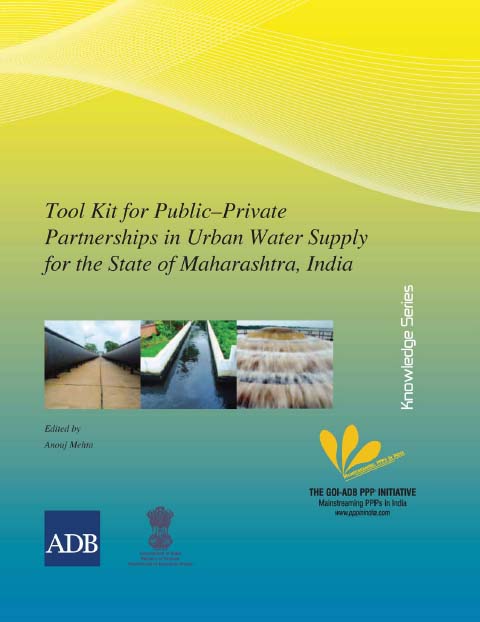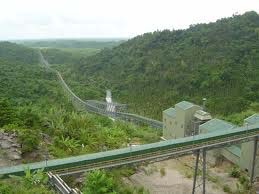/topics/sustainability
Sustainability
Public-Private Partnerships in urban water supply for Maharashtra – Tool kit by GoI-ADB PPP Initiative
Posted on 16 Jul, 2011 06:48 PM
The various possible PPP structures for the sector were studied, and their applicability assessed in the context of the selected sample cities. Consultations led to development of term sheets for these PPP structures, which were identified as most suitable and feasible for implementation.
The above exercise has led to development of this report, which may be considered as a tool kit designed to help decision makers decide whether a particular project might be suitable for the PPP route or not. The tool kit can, therefore, be the basis for approving a project implementation structure as part of the overall project approval methodology.
Prospects and policy challenges in the Twelfth Plan: A special article by Montek Singh Ahluwalia in EPW
Posted on 14 Jul, 2011 08:55 AMThe year 2011-12 is the last year of the Eleventh Plan and this is therefore an appropriate time to review what has been achieved with a view to identify weaknesses in the strategy that need to be corrected, and also identify new challenges that may require new initiatives. The paper is presented in the hope of spurring a broader discussion on these issues.
Groundwater governance in India – A case study by World Bank
Posted on 09 Jul, 2011 11:43 AMIt examines the impediments to better governance of groundwater, and explores opportunities for using groundwater to help developing countries adapt to climate change. It attempts to understand the practical issues that arise in establishing robust national governance frameworks for groundwater and in implementing these frameworks at the aquifer level.
The case study focused on the national, state and local levels. At the national and state levels, it analyzed the policy, legal, and institutional arrangements to identify the demand and supply management and incentive structures that have been established for groundwater management. At the local level, it assessed the operations, successes, and constraints facing local institutions in the governance of a number of aquifers within peninsula India, on the coast and on the plain of the Ganges river valley.
Minister for Water Resources addresses India business forum at the Singapore International Water Week - PIB release
Posted on 08 Jul, 2011 04:06 PMThe theme of the forum was: ‘Sustainable water solutions for a changing urban environment’.
Ministry of Environment and Forest hails Supreme Court Order on Lafarge mining in July 2011
Posted on 07 Jul, 2011 09:28 PM
Photo Courtesy: NewsofAP.com
. The apex court also upheld the revised environmental clearances given to Lafarge by the Ministry of Environment and Forest (MoEF) and invoking the principles of sustainable development, inter-generational equity and the doctrine of proportionality the Bench stated “The word “development” is a relative term. One cannot assume that the tribals are not aware of principles of conservation of forest. In the present case, we are satisfied that limestone mining has been going on for centuries in the area and that it is an activity which is intertwined with the culture and the unique land holding and tenure system of the Nongtrai village. On the facts of this case, we are satisfied with the diligence exercise undertaken by MoEF in the matter of forest diversion.”
Reports of environmental clearance being given to Vedanta at Niyamagiri incorrect - A press note by MoEF
Posted on 05 Jul, 2011 12:21 PMThe Environmental Clearance in that area which was considered in the Ministry of Environment and Forests in fact pertains to the Lanjigarh Bauxite Mining Project, located inter alia in Niyamgiri Reserve Forest covering two districts Raigarha and Kalahandi of Odisha, belonging to M/s Orissa Mining Corporation Ltd.
Sharing the wealth of minerals – A report by Centre for Science and Environment on profit sharing with local communities
Posted on 03 Jul, 2011 08:57 AM The report submits the idea that proposal will go a long way in reducing poverty and deprivation in the mining affected areas. It states that the mining industry’s opposition to the proposal has no basis - statistics prove that sharing profits will not dent the industry’s profitability.
The report submits the idea that proposal will go a long way in reducing poverty and deprivation in the mining affected areas. It states that the mining industry’s opposition to the proposal has no basis - statistics prove that sharing profits will not dent the industry’s profitability.
The central government has come out with a draft Mines and Minerals (Development and Regulation) Bill, 2010 (MMDR Bill) to replace the 1957 Act. The draft bill which has been vetted by a GoM, includes this provision of sharing benefits. The CSE analysis comes out in strong support of this proposal, and clearly establishes how timely and necessary this provision is.
Mining companies and industry in general have been opposing the government’s recent proposal. Their contention is that this provision, if passed by Parliament, would drastically dent their profitability.
The water wheels of time: Micro hydro power in the Western Ghats of India
Posted on 28 Jun, 2011 09:50 AMInternational seminar on innovation, sustainability and development, National Institute of Science Technology and Development Studies, June 28 – 30, 2011, New Delhi
Posted on 27 Jun, 2011 11:21 AMOrganizer: National Institute of Science Technology and Development Studies (NISTADS)
Venue: NISTADS Conference Hall, K.S. Krishnan Marg, New Delhi
Topics:
- Critical reflections on the state of thinking on innovation in India
- Innovation manifestos
- Food and agriculture
- Medicines and technology
- Information and communication technology
- Low carbon innovations
- Grassroots innovations
- Indigenous knowledge
Mining havoc: Impact of mining on water resources in Goa - Article from Dams, Rivers and People
Posted on 25 Jun, 2011 02:02 PM
Pumping of water from Cavrem Sheikh Salim mine, severely lowering groundwater table in the village
Image courtesy: Sebastian Rodriguez, Mand Goa




